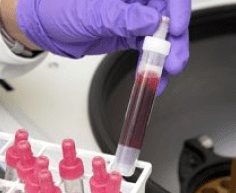‘Biological fingerprint’ in blood could help identify COVID patients with no symptoms
This means they can identify people who have had COVID-19 even if they displayed no symptoms – and the biomarkers last several months after infection.
Current practice requires people to take a PCR test at the time of infection or an antibody test, to see if they had the virus but were asymptomatic.
As a result of the research the team has received £370,000 from the National Institute for Health Research (NIHR) to develop a COVID-19 diagnostic test that will complement existing antibody tests, as well as develop a test that could diagnose and monitor long Covid.
The research builds on a pilot project supported by the Addenbrooke’s Charitable Trust which has been recruiting patients from the Long COVID Clinic established in May 2020 at Addenbrooke’s Hospital.
During the pilot, the team recruited 85 patients to the Cambridge-led NIHR COVID BioResource, which collects blood samples from patients when they are first diagnosed and then at follow-up intervals over several months.
In their initial findings, they identified a molecule known as a cytokine produced by T cells in response to infection – which persists in the blood for a long time after infection.
By following patients for up to 18 months post-infection, the team hopes to address several questions, including whether immunity wanes over time. This will be an important part of helping understand whether people who have been vaccinated will need to receive boosters to keep them protected.
As part of their pilot study, the team also identified a biomarker found in patients with long COVID. Their work suggests these patients produce a second type of cytokine, which persists in patients with long COVID and might be useful for diagnosing long COVID and help in the development of new treatments against COVID.
This is an abridged version of the press release which was first published on our website on July 19, 2021.



